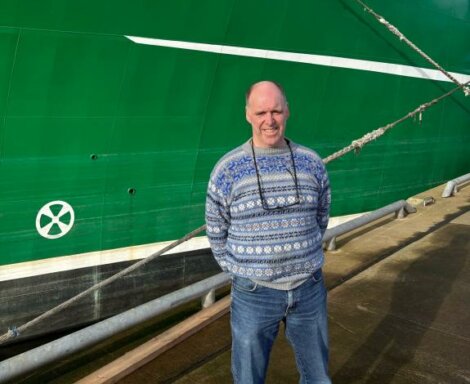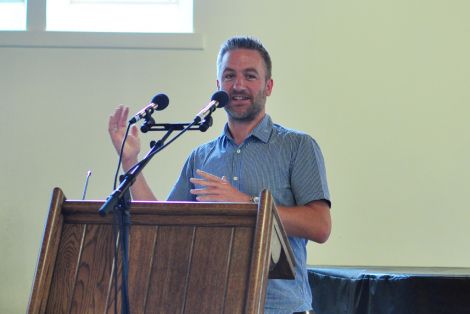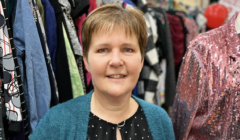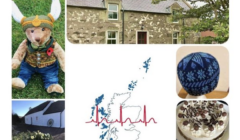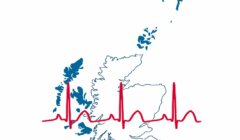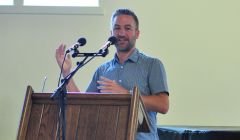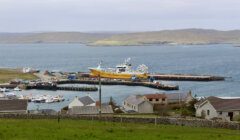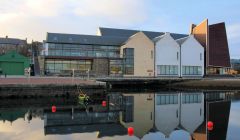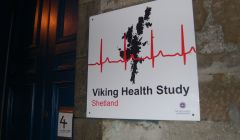News / Whalsay fisherman praises life-saving intervention of Viking Genes project after cancer treatment
A WHALSAY fisherman says a genetic study may have saved his life after he was treated for prostate cancer last month.
John Arthur Poleson, who fishes on the Antarctic, was told he had a genetic variant linked to cancer through the Viking Genes project.
And after tests discovered he did have prostate cancer, he underwent treatment in early February to have his prostate removed.
He praised the ground-breaking work of the Viking Genes project, and said he may not have gone to the doctor “until it was too late”.
More than 60 people from Shetland and Orkney have been given personalised health insights after receiving their genetic results through the research of Viking Genes.
Researchers from the project have identified 108 genetic variants – differences in a person’s DNA – in 23 genes, which can be linked to conditions like cancer and heart disease.
These results were then given to participants, giving them the opportunity to undertake personalised treatment for their condition.
After receiving a letter advising him of a variant in the BRCA2 gene Poleson, from Whalsay, underwent tests that showed he had prostate cancer.
He underwent a successful operation in February to remove his prostate and is already back at work on the Antarctic.
Poleson attended a presentation given by Professor Jim Flett Wilson, who leads the Viking Genes project, in Whalsay last June.
Writing to Wilson in messages shared by Viking Genes, Poleson said he had been inclined to go see the doctor after the professor’s talk.
A doctor found signs of cancer in his prostate last October after blood tests and an MRI scan, and he underwent treatment last month to have his prostate removed.
Become a member of Shetland News
Poleson said it was “all thanks” to Wilson and the Viking Genes study that he had been able to get treatment as quickly as he had.
“I would probably never have gone to the doctor about it until it was too late for anything to be done,” he said.
“It’s been a rollercoaster this last few months that’s for sure, hopefully never to be repeated.”
Experts believe the Viking Genes work is one of the UK’s first extensive efforts in returning clinically actionable genetic results to people involved in the study.
The research also revealed that 10 of these disease-causing variants were much more common in either Orkney or Shetland than elsewhere in the UK.
Viking Genes says the findings demonstrate the power of targeted genetic screening to help improve the health of people from isolated communities.
The project, led by experts at the University of Edinburgh, is investigating the genetics and health of volunteers with at least two grandparents from the Hebrides, Shetland or Orkney.
Researchers analysed the genetic data of 4,198 participants and found small differences known to affect health in about 2.5 per cent of them.
Professor Wilson said these “ground-breaking” results “underscore the critical role of genetic research in foreseeing and forestalling disease.”
“By tailoring our approach to fit specific genetic backgrounds, we can offer more precise, predictive, and preventative healthcare, thereby protecting communities, preserving health and saving lives,” he said.
“The results of this study provide a foundation for creating bespoke geneticscreening programs for the Scottish islanders and other unique genetic populations.”
Since 2005 Viking Genes has recruited over 10,000 volunteers from the Northern and Western Isles of Scotland — regions known for their unique gene pools due to historical isolation and limited migration.
It has previously identified clusters of rare breast and ovarian cancers in Shetland and Orkney involving the BRCA1 and BRCA2 genes.
The latest study is published in the American Journal of Human Genetics, which is being published today (Friday).
It was funded by the Medical Research Council and the Wellcome Trust Institutional Translational Partnership Award and involved researchers from the University of Edinburgh, the University of Aberdeen and the Regeneron Genetics Center.
Become a member of Shetland News
Shetland News is asking its readers to consider paying for membership to get additional perks:
- Removal of third-party ads;
- Bookmark posts to read later;
- Exclusive curated weekly newsletter;
- Hide membership messages;
- Comments open for discussion.
If you appreciate what we do and feel strongly about impartial local journalism, then please become a member of Shetland News by either making a single payment, or setting up a monthly, quarterly or yearly subscription.
















